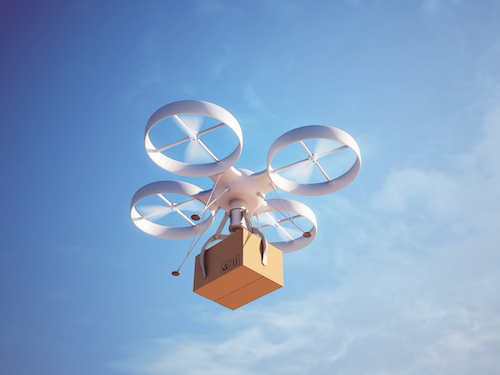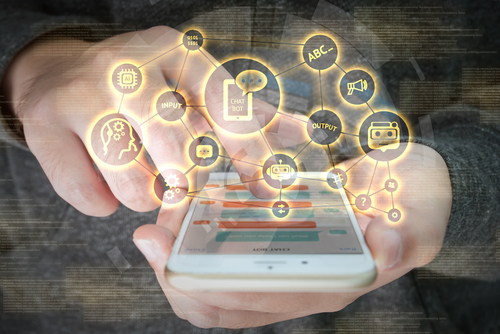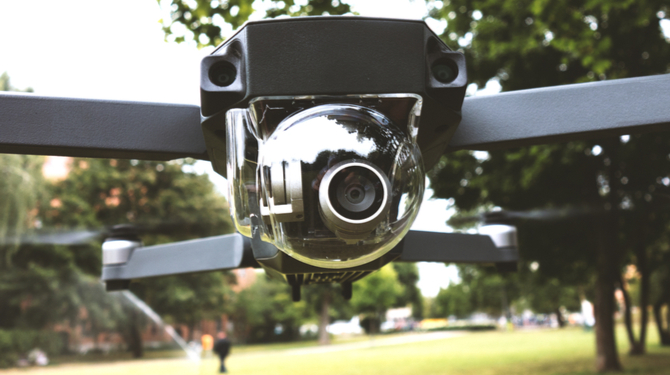Although it is still unclear as to whether Amazon will follow through with developing this technology in the immediate future, it is likely to raise eyebrows, particularly with privacy and security concerns, but also with competitors likely to want to move in a similar area and being potentially cut off through Amazon getting this patent first. Andrew White, UK and European Patent Attorney at Mathys & Squire, David Emm, Researcher in the global research and analysis team at Kaspersky Labs, and Saiful Khan partner and electronics industry specialist at leading European IP law firm, Potter Clarkson examine the issues surrounding this patent and the evolution of delivery drone technology.
Andrew White
In general, Amazon’s patent (US10313638) describes how delivery drones (Unmanned Aerial Vehicles, UAVs) may be used to perform secondary tasks, once their primary task of delivering a package has been completed, and providing they still have sufficient resources left. The secondary task may be a surveillance action that may include flying over a house of a different user who has consented to surveillance and gathering surveillance data. The surveillance data may then be analysed to determine if there is a “surveillance event” – which may include a garage door being left open, a broken window, a detection of graffiti or a fire. An alert may be sent to the user of a service provider if a surveillance event has been detected.
Importantly, the patent focuses on how to deal with surveillance data from users who have not consented to surveillance, and the claims (and thereby the scope of protection afforded) of the patent are directed towards how the surveillance data is processed so as not to include image data from someone who has not consented – a clipped surveillance image is created that obscures or removes image data from an unauthorised area i.e. an area that has not consented to surveillance.
So, in some ways the patent actually could be good news for those concerned about privacy – it shows how Amazon is keen not to obtain surveillance data from those who haven’t subscribed.
Notably, Amazon had to limit the scope of protection obtained (i.e. limit the claim scope) in light of an inventive step objection raised by the US Patent Office over US 2016/373699 filed by a company called AeroVironment. Having such objections raised by a patent office is relatively common and is part of the process that most patent attorneys would go through to get a patent granted for their clients. According to their website, AeroVironment specialise in tactical unmanned aircraft systems and tactical missile systems. The AeroVironment document also relates to how to address and limit privacy abuses resulting from commercial and governmental aerial surveillance.
It is important to note that patents are negative rights – meaning that they permit the patent holder to prevent others from doing what their patent covers – but it doesn’t mean that they can automatically do what the patent covers. There may be other stakeholders in this relatively crowded UAV space that also have patents which Amazon may infringe and/or need to negotiate a licensing deal with in order to do what their patent describes.
It is also important to note that patents can take a while to get granted – this patent was originally filed in 2015 – and in the interim business plans and the commercial realities of the situation can change and evolve. While it can be fun to speculate on patent filings and what this might mean for future consumer technology, quite often the technology described in a patent never comes to fruition, whether that’s because the commercial strategy has changed in the interim or because it is deemed that there isn’t sufficient commercial interest for such technology to warrant the cost of taking it to market. For an example, see: https://www.wired.com/2013/03/apple-patents-realistically/
It is also appears that Amazon have only sought protection for this invention in the US, and not anywhere else. That may indicate that they don’t consider it as important an invention as typically when applicants consider inventions to be very important, they would cover a number of territories, such as Europe, China, Japan and South Korea, also.
Saiful Khan
Having secured the patent for this technology, Amazon has put itself in a strong position to either develop the technology themselves or look to license it to others. Either way, possession of the patent means they hold a strong card.
Smaller, niche businesses shouldn’t be deterred by the deep pockets of global giants, such as Amazon. This is a highly competitive space, with some of the most innovative technology coming out of start-up enterprises.
In our experience, a smaller player with strong IP can present a serious challenge to the big boys. IP disputes between the larger players very often get resolved through negotiation, but smaller firms that can robustly defend their commercial activities can also enjoy considerable success.
Some people argue that IP protection can curtail collaboration in new technologies. We have seen companies like Toyota and Tesla hit the headlines for releasing some of their patent portfolio for royalty-free use (with conditions). There is debate as to their motivation for doing this; but the business rationale is likely to be that they wish to encourage growth of the marketplace as this probably will lead to dividends for them in the end.
However, smaller, specialist enterprises do not have the same luxury and must consider IP at the outset. Clearly marking out your IP territory is essential to realising the commercial spoils of your endeavours and having the necessary resources to invest in future innovation.
David Emm
The obvious one from our perspective relates to privacy. The fact that there is this device which has lots of capability – thermal cameras, regular cameras and obviously geolocation and the rest – and is therefore potentially privy to quite a lot of information. The question is then what happens with the information?
Clearly, Amazon is talking about ring-fencing it so that it excludes what’s in the peripheral vision of the drone, so if you’re looking at my property, you’re not necessarily gathering information on the property next door. Which is fair enough but if a company has the ability to do something there’s always the risk that they might utilise that. I’m thinking specifically of digital assistants where initially, for example with Amazon Echo or Microsoft’s Alexa, they stated that just waited for the wake up command before it would record any information but then it turns out that actually sometimes they’re more alert than that, staying alert to whether someone calls out the name. And then it goes even further than that and turns out that they’re just recording huge chunks of information that’s being analysed. They’re saying that this is just to make the things smarter, make it more effective, sharpen up its ability to hear what’s being said, but what people worry about is when you’re at home you’re very unguarded and it might be privy to lots of personal information.
If we try to translate that across to something like the drone while Amazon – or indeed any other company doing this – might say, “We’re going to be very selective about what we have,” there’s always the worry of whether people will know what’s being collected, will they be informed? Will you be open about how that information is stored and how you might use it? And also about sharing it with other third parties – maybe other companies but also law enforcement agencies. There could be a good side to that; if it’s hooked into law enforcement and they’re able to alert them that something bad is going on at the property. We’re increasingly surrounded by smart devices which are very capable of collectively building up a very detailed picture of the lives we lead, where we go, what we do how we do it, what we’re interested in, what we like buying, and this is one more area where it’s possible to collect information. So the privacy issue is probably the one that will be foremost in a lot of people’s minds.
Whether it’s Alexa, or whether it’s a drone or any other technology, my own feeling on this is that companies that use these sorts of devices ought to be explicit about how it’s operating and what information it’s collecting and also giving people the opportunity to opt out of that. I might want a digital assistant or a delivery drone but actually I might want to say to them, “Please don’t collect any information from me”. The fact that you may have to prod and poke or that you find out further down the line that they’ve been collecting it and you didn’t know it is quite alarming.
It’s an all-or-nothing thing. If you want it, you accept the conditions, even if you don’t want all the conditions. It becomes a bit of a blunt instrument. People don’t read Ts&Cs or end user licence agreements and we know, even on mobile devices where it’s perhaps more straightforward when an app has permissions listed on there, we still tend to not check that out. We want the functionality that it brings and we just click through. That therefore gives people scope to hide between the cracks. We wouldn’t do it if we were buying a house. We wouldn’t necessarily read the information ourselves but we pay someone else to go through it carefully for us.
I see no reason why companies shouldn’t be open about what they’re doing with data. It’s interesting because if we look at some services online, such as Google, where you get a browser or an email address and you don’t pay for it. There’s a sense in which you can argue that maybe the data that they gather is the price that you’re paying for the free use of that service but in the case of something like a digital assistant or in the case of a service you would be paying for with Amazon to monitor your home’s safety, you would be paying extra for that service or for the product, so there’s less scope there to argue that you can’t complain about the data gathering because you’re getting a free service, because you’re paying in cold hard cash.


.jpg)
.jpg)
.jpg)

.jpg)



.jpg)
